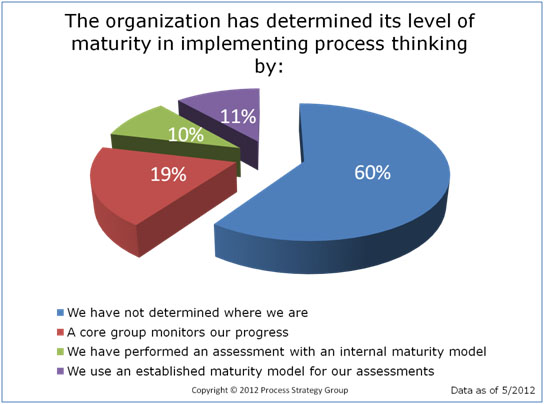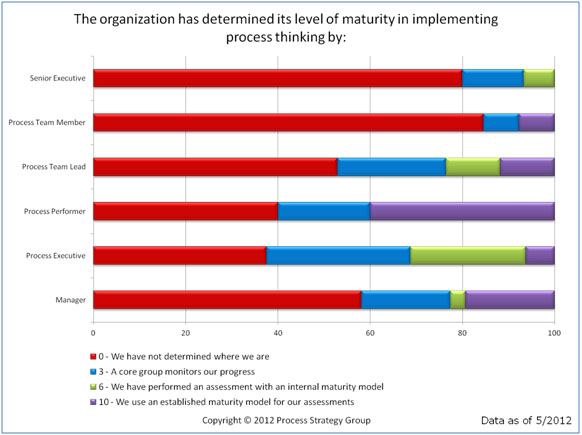Co-authored by: Jerry Stevens, Process Strategist, Process Strategy Group
Most organizations are improving processes in some shape or form.. Many companies employ some type of improvement method, whether it is Lean, Six Sigma, TQM, BPM or some iteration of an improvement technique. They realize that the most effective way to improve how an organization provides products and services to their customers is through the review and improvement of customer facing processes.
But improvement of individual processes can only take you so far. Sooner or later you need to focus on the interaction between processes and begin to manage the organizations portfolio of processes in an integrated manner. You are now moving to managing the organization from a process perspective, to Process Based Management (PBM).
You may be asking yourself: I am in the middle of all this; how do we know where we are, and what we need to do next?
To answer that question, you need to assess where you are. An assessment:
- Establishes a baseline
- Determines what elements of Process Based Management are in place
- Assesses the level of performance, or success
- Enlists and secures management support
- Engages staff in adapting to the new process culture
- Aligns the process approach to strategy
- Provides actionable steps to address gaps
An assessment provides a diagnosis to identify opportunities to improve your PBM deployment.
You already assess different aspects of your organization. For example:
- You produce quarterly and annual financial results to tell you how the organization has performed financially (which is audited or verified by an outside organization).
- Some of you are ISO certified to indicate that you follow your procedures as documented (which requires a periodic outside assessment).
- You follow regulatory compliance reporting to validate that you are in compliance with the rules.
So why wouldn’t you also assess how well you are doing at deploying a process mindset and approach in your organization? Without an assessment, you do not know your progress, and where you need to focus.
Numerous assessments (PEMM, CMMI, PBM, etc.) are available to help determine where your process efforts are. Use any of these, or use an internal assessment to make sure your organization is heading in the right direction. We have found that most organizations think they are doing much better than they actually are. We also see that different levels in the organization have different perspectives of how successful their process efforts are, which is why an assessment is so important. If you don’t have a true picture of your strengths and gaps in deploying PBM, then how can you know what you should focus on for success? Too often we see organizations introduce concepts, tools and techniques before the organization is ready to embrace them, and then they wonder why they fail. So do yourself a favor and do some kind of an assessment, so you know what others in the organization think about your efforts; you may be surprised at your findings!
We tabulated the responses from over 120 participants who have completed the PBM Quick Assessment on the question: “The organization has determined its level of maturity in implementing process thinking by”. The results are shown in 2 different views – Figure 1 is overall results and Figure 2 is results by role. These results are typical of what we see in organizations trying to move to the next level of process thinking.
Responses in Figure 1 indicate that:
- The majority (60%) have not determined where they are. The challenge is that any action you take to make progress may not be addressing where the current need really is.
- A portion of the respondents (19%) have a core group which monitors progress. This is most likely the Process Office, which is well positioned to use that insight to steer action in the areas that will help the organization make progress.
- A smaller group (10 %) has performed an assessment with an internal maturity model. These models tend to be derived from other models, and adapted to the organization.
- The remaining (11%) use an established maturity model for an assessment. In addition to the PSG assessment model, there are other maturity models organizations can choose from (PEMM, Forrester, and OMG, for example).

Figure 1 – Overall Results
The results in Figure 2 show that different roles in the organization have different views of the current situation. The Senior Executives have a less positive view of how or if the organization has determined their maturity levels. The Process Executive, Process Team Lead and Process Performer have a more positive view. The question is which is correct? The only way to determine what is really going on and why different roles have a different view is to do a more in-depth assessment and analysis. With additional knowledge from an assessment you can better target what actions, tools, training, communication or projects need to be implemented to address the differences.

Figure 2 – Results by Role
The objective is to assess where you are periodically, so you know what areas to address to move your BPM efforts forward.
Where would your organization fit into the charts?

















